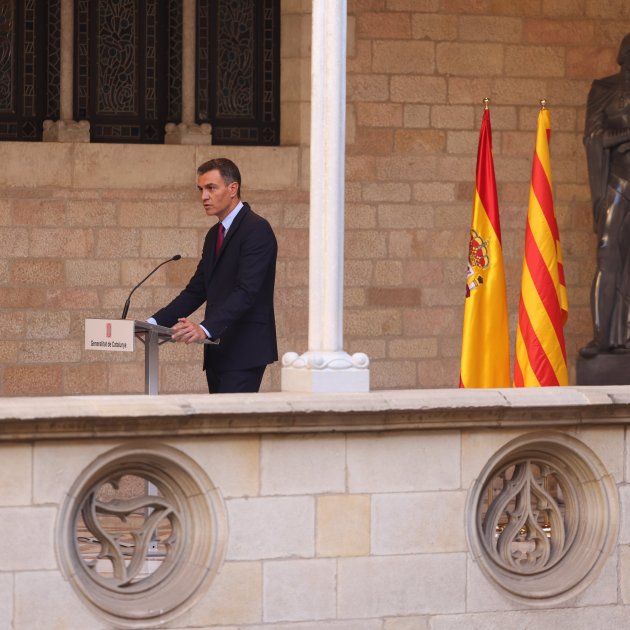Two key ideas: the positions of the sides are "very distant" and the dialogue table must work "with no haste, but no hold-ups". These are the concepts that Spanish prime minister Pedro Sánchez wanted to convey after meeting for almost two hours with Catalan president Pere Aragonès at the Palau de la Generalitat in Barcelona, in the preparatory meeting before the reactivation of the negotiation forum between the Spanish state and the Catalan government. From the Generalitat palace's Gothic gallery, the Spanish PM once again certified his firm 'no' to the two main proposals of the Catalan delegation: a referendum on self-determination, and a law to grant an amnesty to all those facing judicial and police action over the independence process.
In a press conference after the preparatory meeting, the Spanish prime minister sought to warn, despite the cordial greetings, that the "positions are very distant" and that this will take time. "We are reaching sectoral agreements in many areas, but we have very different positions on how to resolve this crisis," said the Socialist leader. "Neither the referendum nor the amnesty are possible," he said, adding that "the prime minister will always respect democratic legality and the constitutional order." He went further and warned that "whatever Spain is, all Spaniards will have to decide, not just a part".
In the face of this, Sánchez insisted on his "agenda for the re-encounter", of which he delivered an updated version with progress to president Aragonès. This agenda includes 44 demands from former Catalan presidents Mas, Puigdemont and Torra over the last decade, minus the 45th demand that they all made: the referendum. Demands that "have had no answer other than silence" so far, said Sánchez. This agenda, he said, "broadens the horizon", because "it not only addresses the political future of Catalonia, but also areas such as infrastructure, economic growth, education, health and social services".
And, although he noted the separation of the positions, Pedro Sánchez also explained that both have agreed that "the table is the best way to bring positions closer and find solutions." That said, the Spanish leader added that "Catalonia's problems did not begin yesterday and will not be resolved tomorrow." And that it is necessary to "work with no haste but steadily, without deadlines." He insisted that "we must move forward without setting dates." An idea that contrasts with the two year margin agreed between the Catalan parties ERC and the CUP in their agreement on investiture of Pere Aragonès as president.
"We hope that we can reach a negotiated solution," said the Spanish prime minister. "That will be very positive," he concluded.
The absence of Junts
Asked repeatedly about the absence of one of the four parties expected to form the dialogue table, Junts per Catalunya (Together for Catalonia), the Spanish PM avoided controversies over the party led by Carles Puigdemont. He limited himself to saying that "the Spanish government deeply respects the decisions of the Catalan government", with the latter having to define the composition of its own delegation. "The important thing is that we get to work," he said.
After the preliminary meeting of the two leaders, the first meeting of the dialogue table proper was due to begin between the two delegations - but without the two leaders, neither Sánchez nor Aragonès.
